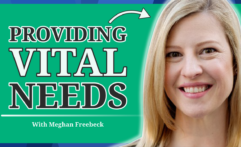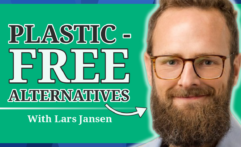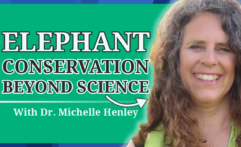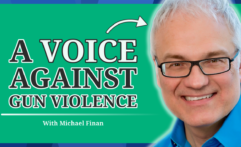How Mapping Trees Increases Their Survival: Jonathon Jones, OBE from tremap (#8)
Affiliate Disclosure
Hey fellow impactful ninja ?
You may have noticed that Impactful Ninja is all about providing helpful information to make a positive impact on the world and society. And that we love to link back to where we found all the information for each of our posts.
Most of these links are informational-based for you to check out their primary sources with one click.
But some of these links are so-called "affiliate links" to products that we recommend.
Why do we add these product links?
First and foremost, because we believe that they add value to you. For example, when we wrote a post about the environmental impact of long showers, we came across an EPA recommendation to use WaterSense showerheads. So we linked to where you can find them. Or, for many of our posts, we also link to our favorite books on that topic so that you can get a much more holistic overview than one single blog post could provide.
And when there is an affiliate program for these products, we sign up for it. For example, as Amazon Associates, we earn from qualifying purchases.
What do these affiliate links mean for you?
First, and most importantly, we still only recommend products that we believe add value for you.
When you buy something through one of our affiliate links, we may earn a small commission - but at no additional costs to you.
And when you buy something through a link that is not an affiliate link, we won’t receive any commission but we’ll still be happy to have helped you.
What do these affiliate links mean for us?
When we find products that we believe add value to you and the seller has an affiliate program, we sign up for it.
When you buy something through one of our affiliate links, we may earn a small commission (at no extra costs to you).
And at this point in time, all money is reinvested in sharing the most helpful content with you. This includes all operating costs for running this site and the content creation itself.
What does this mean for me personally?
You may have noticed by the way Impactful Ninja is operated that money is not the driving factor behind it. It is a passion project of mine and I love to share helpful information with you to make a positive impact on the world and society. However, it's a project in that I invest a lot of time and also quite some money.
Eventually, my dream is to one day turn this passion project into my full-time job and provide even more helpful information. But that's still a long time to go.
Stay impactful,

Did you know that mapping trees is a great way to help protect and preserve them? Well, this and much more is what you’ll learn in our conversation with Jonathon Jones, the founder of tremap!
“It’s become so sexy to plant trees that everyone wants to plant trees. They don’t care about the care and the protecting and the positioning.”
Jonathon Jones, tremap
Three Key Points From This Episode
How Jonathon’s first-hand experience with tree planting schemes triggered him to start a solution to increase their impact…
How we need to go beyond just planting trees…
How tremap is already using AI to help with the tree mapping process…
About Jonathon Jones, OBE
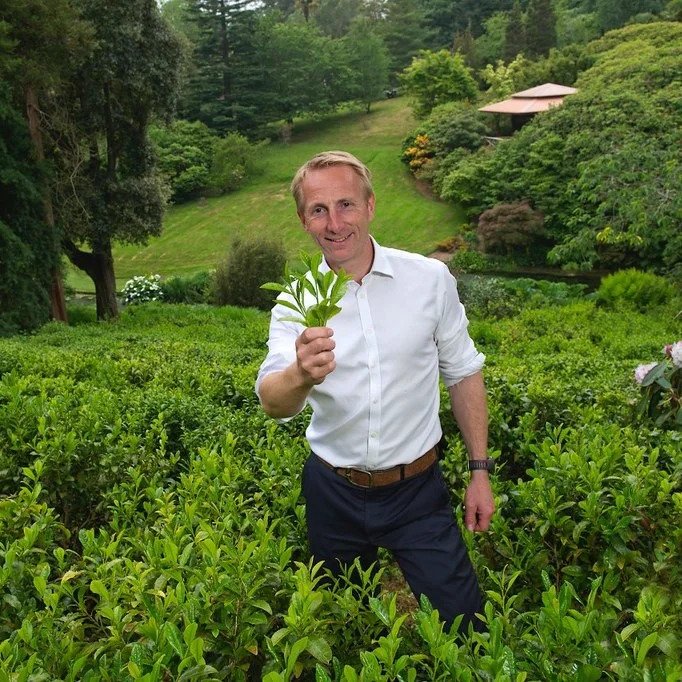
Jonathon Jones wanted an easy-to-use app on his phone to map an extremely rare collection of trees and shrubs. He scoured the market and tested all the tree mapping systems out there, but none were as simple and easy to use as he needed. He came up with a brief with lots of unique features, including to help the collection owners instantly and easily map every tree and shrub. By the end of 2021, the tremap proof-of-concept app and database was on the app stores for download.
About tremap

tremap is a global tree mapping platform with a global database of 15,419,265 trees and counting. This global database aims to bring transparency to trees to help manage them in an easy and efficient way. With the tremap app, you can position and help protect all planted trees.
Links and Additional Information Discussed
Check out the official website of tremap to find out more
Follow tremap on YouTube, Facebook, Twitter, LinkedIn, or Instagram
Find out more about tremap’s journey and the additional solutions they offer
The Full Transcript
Dennis: Hello, and welcome to the Impactful India Show. I’m your host, Dennis Kamprad. And today, we are joined by Jonathan Jones, OBE, from tremap. Jonathan, welcome.
Jonathon: Thank you, Dennis. Great to be with you.
Dennis: My pleasure. Now before we get started, give us a brief overview. What is tremap? What are you doing there?
Jonathon: tremap is the 1st way of mapping trees all over the world in a totally transparent way. So we put every tree, in fact, on your phone. Wherever you are in the world, You see where the trees are. So there’s over 3,000,000,000 trees, and it’s a way of opening up the world of trees to everybody whether you’re tree experts or not.
Dennis: Beautiful. I’d like to to get a little bit deeper into this but I think that’s a that’s quite a nice start as well. And the second question I noticed your name at the end you’re basically called OBE. What does that stand for? Is there maybe any connection to the trees as well?
Jonathon: It is a connection because every year, I plant for A very large estate in Cornwall, a Lord Farmer’s estate, Trigothnan. We plant over 20,000 tea trees. And part of those become in fact, have become Europe’s largest tea plantations and the 1st commercial tea gardens In the United Kingdom, so most people are very surprised that we can grow tea in England, and therefore, I’ve become known as the tea man, I suppose. But I always have been passionate about trees and trade and export. And I was very surprised a couple of years ago When her majesty, the queen, awarded me an officer of the British Empire, which is an OBE. And, it’s a great honor, of course, and it Usually means that it’s others’ brilliant efforts is what the joke in England is all about because you know that if someone’s got an OBE, they’ve got a great team supporting them, and I’ve been very fortunate To have had that. So we export British grown tea all over the world, but tremap is really about us counting and locating every tree that we’ve ever planted, Geolocating every tree, and that includes tea bushes because tea bushes, if they’re allowed to grow, become big trees.
Dennis: Beautiful. Now you already mentioned that you basically had a long long passion for trees as well. Let’s kind of rewind your journey a little bit and start, like, a little earlier. Before starting tremap, What did you do? What’s your experience there?
Jonathon: So I’ve worked in, botany and business. So my background is in botanical water culture, really, and I I love growing things whether that’s From seeds or cuttings or I loved collecting rare species from all over the world and helping preserve and create collections of those. We’ve grown them at Tregothan and as part of a pioneering collection of endangered and rare species, and people come from all over the world to to visit those. We’ve done exchanges with botanical gardens, and I used to go out a lot more than I do now visiting wild origin species just like the intrepid Victorian plant hunters and spent time with amazing plant experts all over the world. So that was my history, I was very fortunate to be put in charge of a collection of very special and rare trees at Trigofnan, and we’ve built up some, What we call national collections of very rare species. But one of the frustrations was the difficulty we have in mapping and Looking after really good plant records. So plant records are so important. You need to have accurate detailed records of where your things are planted.
Jonathon: Otherwise, Your collection isn’t worth very much. So, in our hands, we’ve all got mobile phones, and it seems crazy that we couldn’t go out into the garden or the forest And locate all our trees. So that’s kind of true in the wild as well. I used to collect and map very rare species in Chile. And you’d be going around thinking this is crazy. We’re using an old fashioned GPS device when I know that the technology should exist to be able to do it from our Mobile phones. So in my in the back of my mind, I was growing another idea to actually produce tremap. And I had also quite a lot of Business experience working for Plimsoil Publishing and helping busy managers understand their business better.
Jonathon: So botanical stuff And business stuff and bringing those 2 things together. I I just love it.
Dennis: So it sounds like you have you had some experience on both sides, but then So you saw like a really big challenge going on based on your own collections maybe, but then also based on like, well, you know, the technology should be better than what it used to. But it’s not there yet, the solution. So I was like, well, you found the problem. You had the solution in mind. You had a a way to go to the solution. What was your first step or next steps to to get it going.
Jonathon: Well, looking back, Dennis, it’s always easy, isn’t it, to package it up in in a podcast and say, oh, we did this and we did that. But the truth is very messy. And I I’ve spent many years struggling with the problem and realizing that a solution literally lay in our hands to be able to use our mobile phones instead of just texting and talking. Why couldn’t we actually go in the garden and And map our trees and shrubs in real time in real situations. And I thought, surely, someone must have done this before. And I I had that feeling odd years ago when I started growing tea, you think, I can’t believe no one has grown tea in England before because if it could have been done, it would have been done before. And then you just keep pushing a little bit.
Jonathon: And, of course, we’re always busy, and you don’t have time to do things as quick as you like, so it takes usually years and not months. And then you realize, actually, nobody has created tremap. We need to create this thing, and we have to do it ourselves. So Then you have to build a team, find support. And, of course, number 1 is find funding, which is very expensive to do these things. And, and then you realize we’ve got momentum. We’ve got backing. And then suddenly, you create a sense of Unstoppability.
Jonathon: And we’re gonna map the trees, and we’re gonna grow the tea and do all the things that seemed impossible, and suddenly, they’re unstoppable.
Dennis: Yeah. It’s beautiful to see like when you have something super concrete like just the numbers of trees map for example. It’s a really nice benchmark to see, like, oh, it’s growing, it’s growing, it’s growing more. And with probably every team member of every additional person, like, adopting dream app, you see that number growing Maybe nearly exponentially in the beginning before we cross more linearly.
Jonathon: Oh, is it yeah. Really, it’s so true, so even this week, we’ve had a breakthrough because we got over 15,000,000 trees mapped. A year ago, we had hardly any. So it’s exponentially growing. And just this week, we’ve had the backing of UK funding. And it’s so Congrats. The, you know, UK government has realized So this is actually a huge benefit to the environmental agenda. Can you believe, Dennis, that we are investing 1,000,000,000 of pounds in every country in tree planting, and we don’t even know where the trees currently are.
Jonathon: So it’s like a baseline audit of trees. And can you imagine any other the high expenditure going on without understanding our baseline situation? That’s what tremap does is bring transparency t two trees and and stops greenwashing. And that’s what I loved about Impactful Ninjas is is that you you cut through all of that and bring transparency Situations. And I think that’s what we wanna do at tremap.
Dennis: Thanks so much for that as well. Like, we’re always trying to, like, take the big picture and see, like, how does these How do these things fit in and like going as deep as possible. When I’m when thinking about like mapping the trees as compared to just like well, As compared to planting trees one probably comes with a much easier to communicate the benefit is like while we plant a tree Those are all the benefits from the tree versus you would probably I assume have to create some awareness by tree mapping also is so beneficial as a starting point. Was that anything that you faced or anything that you need to to overcome?
Jonathon: Massively. And I still underestimate that. It’s become so sexy to plant trees that everyone wants to plant trees. They don’t care about the care and the protecting and the positioning. And so in early days, like, I say early days because we’ve been running it back two and a half years now, we came up with the 3 p’s, Position, protect, and then plant. Not plant, plant, plant, which is what everybody wants to do.
Jonathon: And it it’s a really difficult message. We’re still working on this, and we do lots of media interviews and talking to people to get the message across that planting trees is not the whole picture. You do need to position and protect. And And it it’s not so exciting and it and it’s more boring stuff. But if without positioning protecting, planting is almost guaranteed to fail. And unfortunately, I was involved in some very big tree planting schemes over the years, and most of them probably suffered less than 5% success rate. So 95% failure rates, and this is not uncommon. And so a lot of the trillions of trees which are being pledged, Sadly, we’ll never make it because the investment, the boring stuff, if you like, the bit that we need to do is not so eye catching as, you know, someone going out with a Fade and planting a tree is very impactful, it seems, but truly the impact is in knowing where the tree is, knowing what the tree is, And making sure that it’s monitored and transparent.
Jonathon: So that’s what tremap is doing. And slowly, that message is getting through. We’re making some Really nice exciting wins at the moment talking to partners who get that, that it’s going beyond just the planting stage and thinking about The true impact of what trees can you know, so many positives that they can bring us.
Dennis: Mhmm. Just thinking about connecting to the partners that you mentioned already. So one of the big things when thinking about planting tree would be carbon offsetting for example. One other big thing would be governmental initiatives to, well, basically Plant more trees to green the cities to green the environment again. What would be your partners, and how could you well, help them create more value with the dream mapping?
Jonathon: So we’re still discovering the true values of knowing where every tree is, and there’s lots more we’re discovering on an almost weekly basis. So initially, it’s Preserving and protecting very endangered species. So we do those in situ as we call it in the wild. We also do that ex Sichu. So that means in botanical gardens and private collections. And some of those are so rare that we actually hide them from view so they are mapped, but you have to log in and See those specialists. Otherwise, it encourages people to potentially go and steal or, you know, do damage to very rare things. So that’s on 1 very specialist level All the way through to, as you talked about, carbon calculating and offsetting, I don’t think it’s a secret that carbon calculations are Pretty wildly inaccurate in most cases and and not transparent.
Jonathon: So we want to work with the best universities around the world And help bring transparency to those calculations so that we can help build a picture of what species contribute the most, you know, what Climate, what areas? There’s so many details. It’s so nuanced. But we’re very happy that we’ve got partnerships now with to shoot in America. Mhmm. We’re working with the Eden Project in Cornwall and around the world. And Botanical Gardens are now partnering with us Across Europe and in Asia, in Australia, and it’s really exciting time that people are understanding that we can now do something about this. And What’s more, Dennis, is open it up to people who are not specialists. So Mhmm.
Jonathon: tremap is an app on your phone as well, which is free to download, and we’re hoping people like The Nair Hotel in Cornwall will will work with that to sponsor certain species like Magnolia camboli and make it accessible so that Anyone who’s just not necessarily a connoisseur but just appreciates trees can enjoy them and access the information. And we’re trying to democratize What has been fairly hard to get information so that wherever you are in the world walking around, you can either locate the tree yourself Or you can find it already located on tremap and take a photo, read about it, understand its history, and be part of something that Is Rilius a global citizen’s army involved in trees?
Dennis: So there’s quite a few thoughts coming to my mind. Firstly, like, When you mentioned when you initially started you couldn’t believe that there’s like nothing out there yet that uses the existing technology to make a much much better like tree mapping process instead of uses GPS. One One of the things that it’s quite similar when when we start with Impactful Ninja was that it seems like there’s no not enough or no direct Monetary influence, for people to really get it started. You see so many different industries that are essentially doing Very similar things from a technological perspective and that’s just crowded. But then when it comes to, well, the main purpose is doing something good, not just Getting more money. That’s where a lot of things are just lacking. And then you see this journey also the voluntary carbon market, How that increases over time. How the need for calm offsetting solutions not just calm reduction.
Dennis: Like as a whole holistic picture increases and there are some scandals with, Let’s say some of the big verification companies. It seems like you might even able to just think out loud create yourself your own niche when it comes to, Well, verifying specific trees, how they are, and how they progress over time just as like a one thought.
Jonathon: I I totally agree. And as we progress with this, I think more of that will happen. So at the moment, we don’t know all of the applications that tremap will be useful, but the data that we’re building on a daily basis now is proving really interesting to specialist tree you know, universities, etcetera. And we collaborate very much with these people. And we want to become like a tree d f of PDFs, if you like.
Jonathon: And a a really open platform, and We’ve designed it in such a way that we can take existing tree records and we can export our records into other people’s systems because It’s in everyone’s interest to know where the trees are.
Dennis: Let’s just assume I download a tree map on my mobile phone. I would just be walking outside. How would I ensure That I’m taking the correct images, correct pictures of the trees, how that I’m mapping them. So that once, if the tree is already mapped I could You mentioned this might be some information I could double check. Or the second, if it’s not mapped that I would be mapping it correctly. What would be my steps here?
Jonathon: So It’s actually super easy to map a tree because your phone is gonna be pretty accurate. Today, the new phones get down to usually about a meter or even less Geolocating, which if you think about it, most trees occupy much more than that space. So you can be pretty confident that you don’t need to know anything about the tree. You might think, oh, I’m not sure what species it is. And I’ve spent my whole life in trees, and I still would be the 1st to admit I don’t know what A tree is because there’s thousands and thousands of species and, you know, you might be one of the lucky ones that finds a new species. So don’t Give up. You must map the tree. Take some photos.
Jonathon: Take 3 if you can. There’s 1 generic photo of the whole tree is really valuable. If If you can get a close-up of a flower or a leaf, that’s fantastic because that really helps botanist to identify. And the third thing is Something we call TBH or diameter at breast height. And if you imagine your chest height and taking a calculation, an estimate of the diameter at That hi. That’s a really useful piece of information, but you don’t need to do all of those things. You can just say, I don’t even know what the tree is. Just take a photo, Located and someone else will think when they’re looking through the records, they’ll think, wow, that guy has just recorded a really rare ash tree or Hey.
Jonathon: Did you know that that tree’s got some kind of rare disease that we didn’t know existed in Poland or somewhere? So you just are building up and contributing to a great knowledge of trees that will be fantastically useful now but also for future generations. Because You may know this, but there’s tree diseases rampaging around the world, and many of our species are actually dying out in certain parts. In certain other areas, you’ve got new trees appearing. You know, you’ve got massive acacia populations appearing in the Sahara Desert, which is Amazing. We need to map all those trees so that it’s mapping and recording. And people say, well, what if the tree gets cut down? And it provides a record of What is growing at the date that that person has taken the record for us, that is so useful for future generations because, for example, certain species Won’t grow where the same species has been growing, so you can help prevent those specific replant diseases. So never I think it’s not worth mapping a tree. You don’t need to be a botanist.
Jonathon: Anyone can do this, and it’s a really valuable thing to do.
Dennis: So basically I’m hearing when I’m using the app I could just, like, take a picture. Let’s just say I’m lazy. I’m just taking 2 pictures, like, 1 general picture and one of the One of the leaf but even that approach without like the diameter would even better chest height but even without that it would already help you One to see which tree is where. Then it might even be able to help preventing diseases in the trees when someone has a look and it’s like, oh, some diseases are happening. And the third one even with these 2 pictures it might help like for the future plantations to see like well those trees were already there beforehand. Let’s put another species in there to basically increase the chances for growth and survival.
Jonathon: Exactly that. And it is very valuable and fun as well. You know, Hunting for Pokemons is fun, but this is more real. And it it’s addictive, Dennis. Be careful. You’ll you’ll get one of these badges sent to you. So when you get into Serious tree mapping.
Jonathon: You might think, oh, how could anyone get serious about this? But you’re doing something really impactful, really fun. It’s interesting. It’s healthy. It’s outdoors. Children like to get involved. And if you want to access all areas, we’ll give you a lanyard, and you can Go into places and say, I’m here to map trees. Most people will welcome you because they want their trees mapped. Most people are very Interest to know about their trees.
Jonathon: They may be the landowner, and they may not know how many trees they’ve got, what the species are, where they are. So most places will welcome you with open arms. But, of course, some people are very, very private. You have to respect that. But by and large, Most people love trees and will welcome anyone who wants to get involved and help map them.
Dennis: Nice. Sounds like there’s already some some part of gamification built into the system of, or, like, dream mapping. Probably, like, with with these clear cut numbers and everything that happens in the journey, there are probably so many more opportunities for the future as well.
Jonathon: You’re so right. And gamification is something we talk about a lot at tremap. There’s not enough built in at the moment, but it’s coming. We thought we would work with the scientific community 1st. Mhmm. And we have these roundtables which are so good sort of forums for tapping into Smithsonian and or the Eden Project, and we have them all Coming together with the BBC and, you know, the media people, if you like. And but that’s taught us so much about what, You know, these kind of questions that you’ve been discussing today and what people are scared about, what they’re happy to do, and the gamification bit This is something that we definitely need to work on. And I’ve even been told off by academics in the UK for being too geeky and too academic.
Jonathon: And I thought, this is fantastic. We were trying to Win the academic community first because we need them to support us and we need to share information with them. So now we’ve got their backing. We can now have fun And engage with, you know, gamification, which, frankly, is is the next step. And that that’s gonna be when it gets really fun.
Dennis: Yep. It feels like also this, like, Like when it came to business it would be like a two sided business model. On the one hand side you have people taking pictures of the trees and that, gamification helps a lot. On the other side then you have like people or organizations or your computer having a look which tree is it, what diseases are there, what’s what else other information would be happening there. And you also mentioned like, oh, people are scared of some maybe new things as well, which led me think like, oh, what about this AI? What about machine learning From, let’s say, tree pictures, tree species, and everything else, is that also something you already incorporated into that side of the park?
Jonathon: It is. And we’ve been very fortunate that doctor John Kress of the Smithsonian Institute has always seen tremap as a huge potential win for The tree community, if you like. And he is well known around the world for his authoring of the best books in North American trees, and He’s also a specialist in some of the tropical Bosnia. And he developed through the Smithsonian a really cool AI App for identifying species by using your camera. This is using facial recognition technology, and it was one of the first but Still one of the most accurate of that genre if you like. And because we’re outside of the academic community but collaborating with them, we’re able to take things to market more quickly. And what we hope to do with doctor John Kress is actually incorporate that technology at the right stage with What we have, which is basically geolocating the tree and then building in the AI element so that you can verify probably to within about 98 Point something percent accuracy. But recognizing that there’s always gonna be limitations, there’s always scope for human Input and AI is fantastic, but it won’t be the full story.
Jonathon: And and there’s no substitute for what we call ground truthing. So any person can be a ground truther. You just need somebody with a phone on the ground proving that that tree is there. And that is irreplaceable, that human element. So, yes, we can do lots with satellites, and we work closely with the space community. In fact, I should pay tribute to the Cornwall space industry for backing tremap. They’ve been fantastic, and we rely on their technology, of course, the Assets and space to map where we are anyway. So we we have to collaborate.
Jonathon: We very happily do that. But there’s no substitute for you or anybody Wanting to be on the ground and ground truthing that data. So you don’t need to be a tree specialist to be playing a very important role in that.
Dennis: To connect things to that already, you you mentioned like a kind of like a little outlook into, like, all the possibilities and opportunities that are still ahead of you as well. So what would you say? What what would be the future for tremap? What are you envisioning there?
Jonathon: So tremap will bring Everybody into contact with trees, and the whole world of trees will become transparent. And we want everybody to feel connected with trees and demystify that and Prove to companies and individuals and academics where the trees are and how they’re doing, that’s a great achievement and will be, you know, Proving to the world that people love trees. So there are roughly I think there’s 7,000,000,000 phones in the world, more than there are people. So everybody can access this. Obviously, there are certain countries like China and North Korea, which will probably be tricky to to collaborate with. But I am going to China, next month, and I’ll be mapping a few trees there. And we’ve mapped trees around Asia. And I think the whole world can get part into this, and children can be part of it.
Jonathon: And we want To make that data accessible and consumable by everybody. So if a company wants to sponsor Tree mapping in their community or around the world, they can do that. If we want to prove that a certain species is improving or declining, This is a way of doing that. So it’s a platform. It’s the tree platform for everybody to access.
Dennis: Yes. Which is the perfect transition into Everybody to access, basically. How could we how could we support you? What would be the best step for for anyone listening, watching to, well, go ahead?
Jonathon: Well, we’d love you to go on to the tremap website. That’s t r e m a p, and just have a a look at what we do and Send us comments. We love brutal honesty so people can tell us what’s working for them. Download the apps, of course. The tremap app is on the app stores. And use it and tell us about it. And, you know, as each iteration comes out, there’ll be improvements. The more users we get, the better it is.
Jonathon: So, you know, get involved. Have fun. Talk to us about gamification. And, you know, if you want to be part of that trialing community, you’re welcome. We’d love to have you on board.
Dennis: Beautiful. We put the links into the show notes as well and link it on screen. Now since people might be asking as well, and we talked about this before, Why is a dream app spelled with 1 e instead of 2?
Jonathon: That’s a good question. So we’re headquartered in Cornwall. So Cornwall is in many ways the original West Coast Of the world. So everyone thinks West Coast California, but actually Cornwall has a great surfing scene. We’re super fast fiber connected. We’ve got satellite earth stations. We’ve got a space port. I like to think of Cornwall as as the new West Coast.
Jonathon: And in Cornwall, everything begins with t r e. It means house. So this is like the house for trees, tremap. And around the world, of course, t r e m a p will probably pronounced as tremap. In Cornwall, it’s often tremap Because, you know, Trigothnan, Trigoth, you know, there’s lots of lovely tree names, and it works. It’s a short, easy to search name, And we think that we can do a lot from this rural part of England, but actually help people get involved in trees all over the world. And Just this week, in fact, our former environment minister, George Eustice, has come on board tremap to advise us. He’s leaving office now and therefore not political.
Jonathon: And he helped design the environmental assessment Architecture. And there’s so many opportunities in so many countries at the moment to to understand what we call biodiversity net gain of which Trees are probably the most iconic part and the most easy for people to recognize. You know? No one can argue if that’s a tree. There there it is. You can all see it, and we can all agree on that. So that’s what we’re about, democratizing it. We want to do that all around the world, and we want to invite everyone to get involved mapping trees.
Dennis: Beautiful. Before we go into the final part about audio learnings and also learnings class, is there anything that we forgot to talk about or forgot to ask you about tremap?
Jonathon: I’m still learning, Dennis. So every conversation I have with people like you, it it stimulates us. It makes us think. And that’s what it’s about. It’s, You know, we’re discovering more about trees that we didn’t know ourselves, new technologies emerging all the time. You never know who’s watching this, who might Have some amazing idea that we think, yeah, that’s one we’ve got to incorporate. So get in touch. Talk to us.
Jonathon: We love what you do at Impactful Ninjas. And If there’s any company that you work with that wants us to, you know, give them some tree data, just talk to us.
Dennis: I like that. Now let’s make a little Let’s jump to to the next or, like, our final section and let’s speak about some personal learnings. So let’s start with you from When you started your work with tremap, how would you say has that influenced your personal life? Did anything change there for you or any or anything else you wanted to share about that?
Jonathon: Oh, lots. Yeah. I think the road map that I had in my mind for building tremap as a self sustaining business, you know, Sustainable. We have to have revenues to support us. So my goal is to have it as a purpose driven but profitable business so that we can deliver our bigger So that’s starting to happen, but everything takes longer than you think. And then suddenly, something else comes along that accelerates. And you think, wow, I wasn’t expecting that part. So I kind of learned that lesson in life with the tea business and other things.
Jonathon: Talking to other businesses is something I love doing because Constantly learning is is what we all do, isn’t it? But I think tree mapping is one of the most rewarding things because if you love trees, There’s an old expression in England that old men plant trees, and I guess I’m not as young as I used to be. And you can still enjoy trees, get involved in them, and map Yes. It’s business, but it’s also really fulfilling and wholesome and fun. And I’m surprised at that element, I think. The I guess, Stresses of setting up a new business are always real, and we’ve got global ambitions. And that’s important to do deliver what we said, you’ve gotta have fun along the way. And I think making time for that is so important for any young
Dennis: business. Nice. And if you had to share with us one tip For us to become more impactful ourselves, what would be that one tip for us?
Jonathon: I think we have to be very careful with the language we So I think I’m learning more and more that we’re living in an age where everything’s an emergency or crisis, and that in itself doesn’t help with rational thinking. I think we need to To be sustainable and respect the environment and nature, which we love and we do, I think we have to be a bit calmer, and we have to be more reflective. And sometimes we do need to move quickly. I’m not denying that. But I do think that there’s a sense of panic at the moment, which is probably not helping us have rational positive thoughts. And to overcome some of the challenges that we face at the moment, I think we just need to be more reflective and take time to think. And being in nature And getting out and being a part of the wonderful environment that we all want to protect is probably the most important thing, I think. Just enjoy the wonderful creation and get out there and then be part of it.
Dennis: Beautiful. Thanks. Thanks so much for sharing that. Thanks so much for being here and all the best with tremap.
Jonathon: Thank you, Dennis. Wonderful to be here.
Dennis: Thanks. My pleasure. And to everyone else, thanks so much for joining us as well, and stay impactful.


